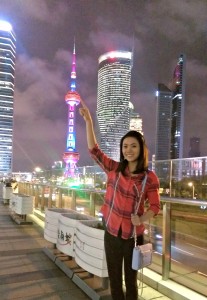Food delivery in Shanghai and a discussion on cultural differences
Guest post by Emily Su, Foster undergraduate, studying marketing and pursuing a Certificate of International Studies in Business. She studied abroad in Shanghai, China this summer 2015.
 The story that best highlights my international experience is not a story that’s groundbreaking, daring, or jaw-dropping. But, it’s a pleasant and humbling story that is life-changing and something I’ll never ever forget.
The story that best highlights my international experience is not a story that’s groundbreaking, daring, or jaw-dropping. But, it’s a pleasant and humbling story that is life-changing and something I’ll never ever forget.
We are all aware that there are striking differences between Chinese and American systems. Chinese views on politics, economics, social class, independence, and freedom (just to name a few) are drastically different. Going into my study abroad experience, I did not expect to have the opportunity to talk with locals about politics and social issues. In China, these issues are sensitive. Often, they are a big no-no for open discussion.
One day, my Chinese roommate and I were deciding where to eat lunch—at the cafeteria? The food court at the neighboring mall? A noodle restaurant ten minutes away? Before we had decided – thanks to typhoon season in Shanghai – a torrential downpour began outside. So much for a lunch date outing. Immediately, my Chinese roommate pulled out her phone and showed me an incredible App, 美团外卖 (Mei Tuan Wai Mai), that featured thousands of restaurant selections nearby. They all had built-in speedy food delivery services. When she told me that food delivery in Shanghai is often cheaper than dining in, my eyes lit up. I knew I had discovered something amazing. We ordered multiple flavors of dumplings and within 30 minutes we were eating to our heart’s content in the safety and protection of our dormitory.
I kept gushing about the food delivery system in Shanghai, since America seems to be a little behind on this trend. This sparked one of the most genuine, interesting, and meaningful conversations I have ever had. Despite my expectation of avoiding political topics, my roommate initiated the discussion of some political issues. We talked about an array of topics, from gun laws to voting, from traffic laws to pollution. We discussed differences in entrepreneurship and corporate tax. What started off as curious conversation about voting, became an exciting and enjoyable exchange of perspectives, experiences, and questions. I found myself asking more questions than giving answers. I never thought I could ask so many questions at once, and I never thought anyone could be that curious about my home country. I could probably have written a book about all the things I learned that day about differences in Chinese and American culture.
I absolutely love to discuss differences in cultures. I like to observe, and so almost everything I experienced in Shanghai, I would compare to the American version. Comparing cultures and seeing the huge differences in daily life is mind-blowing. Chinese people may cook completely differently, interact with friends differently, or even wash their clothes differently, but it somehow works. Different societies, whether it be because of political/economic/geographic/social differences, just have different ways of getting the job done. That’s what I’m fascinated about. I learned that there is no one culture that is the best or the greatest in all aspects. Learning more about another country has helped me realize this.
My ancestors are from China. I was born and raised in America. This study abroad experience was a wonderful way for me to bridge the gap, to understand the meaning of and be the representation of Chinese-American. This is exactly what I needed to pursue my career in international business. And, the bridge will only become shorter and shorter.
